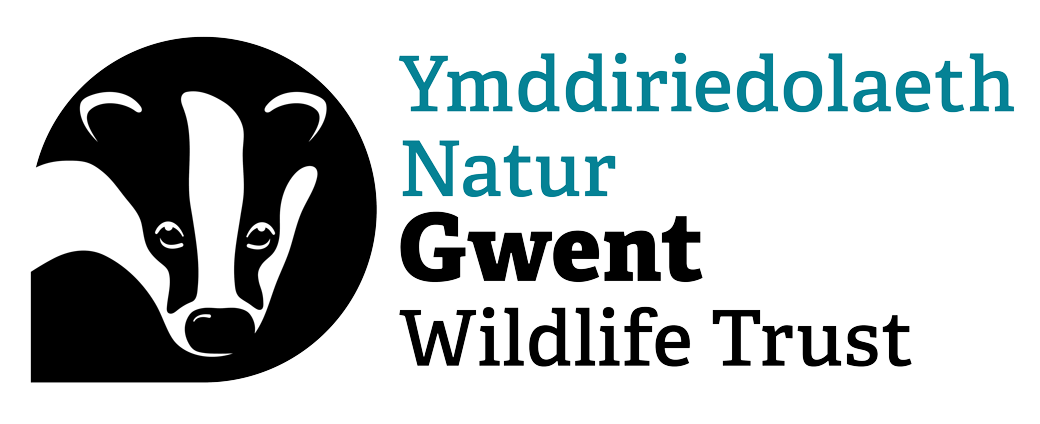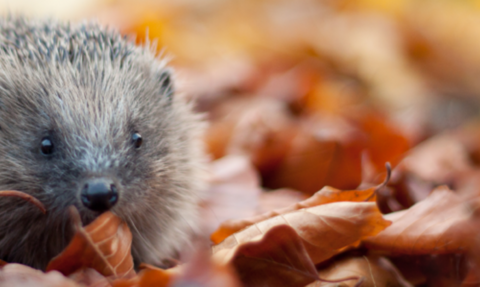
Wildnet
How to Help Injured Wildlife
People often ask us what they should do if they’ve found sick, injured or abandoned wildlife. Gwent Wildlife Trust is not a wildlife rescue organisation so we do not have the facilities to care for wildlife but we can provide advice and contact details for organisations that can.
Avian flu - update to threshold for reporting dead waterfowl (Last updated 20 02 2023)
Defra has changed the thresholds for reporting dead waterfowl. If one waterfowl is found dead, it should be reported to the helpline or via the online reporting system. It was previously if three were found dead.
Members of the public should use the reporting system if they find:
- 1 or more dead bird of prey, gull, swan, goose or duck in the same place
- 5 or more dead wild birds of any other species in the same place
Defra's advice remains that the public is not to touch or pick up any dead or visibly sick birds.
To read the latest advice from Defra, or to find contact details as well as access the online reporting portal - please click here.
Who can help?
If you're looking for a local wildlife rescue, the best resource is the Help Wildlife Directory - here
The RSPCA is a national organisation that covers Wales. Whilst they do rescue and treat injured wildlife, they predominantly focus on larger animals and birds.
Help wildlife has a website with more detailed advice on what to do with injured wildlife, and also have a useful map to help you find a local wildlife rescue service near you.
There is a network of dedicated volunteers and smaller wildlife hospitals that may be able to help with the rescue and care of injured or orphaned animals. We have collected the contact details of some operating in the Gwent area and listed them below.
Local Rescue and Rehabilitation
Organisation |
Location |
Region Covered |
Contact No. |
Web/eMail/Facebook |
Notes |
| British Divers Marine Life Rescue | UK-wide | 01825 765546 (Office Hrs) 07787 433412 (OOH) | https://bdmlr.org.uk/contact | ||
| Peter Ingram | Monmouth area | Local | 01600 716672 | ||
| RSPCA | UK-wide | 0300 1234 999 (Emergencies) 0300 1234 555 (Advice Line) | |||
| Socelex Sanctuary For Injured Animals | Trinant, nr Newbridge | Gwent |
07968 102817 |
Bats, Corvids, Foxes, Garden Birds, Gulls, Hedgehogs, Migratory Birds, Pigeons, Rabbits & Hares, Voles, Waterfowl | |
| Mustelid Rescue UK | Crumlin | Local to Newport | 01495 211401 / 07903 965281 | Mobile no. is 24/7 | |
| Fauna Wild Rescue | Cardiff | Local | 07796 796791 | https://www.facebook.com/FAUNAWildlife1/ | Pigeon, gull, squirrel, rat and mouse friendly. Recue/care of sick, injured, orphaned wildlife for recovery, rehabilitation & release. |
| Marlow Vets | Newport Rd, Chepstow NP16 5BB | Local | 01291 624090 | ||
| Secret World Wildlife Rescue | Somerset | Local | 01278 783250 (8am-8pm) | https://www.secretworld.org/wildlife-saver | Good information on their website. |
| Vale Wildlife Hospital | Tewkesbury | 01386 882288 (7am-5pm) | http://www.valewildlife.org.uk/ | Open 24/7 - no need to phone ahead. Animal Ambulance available. | |
| RSPB | 01767 693690 (9.30-16.30) | https://www.rspb.org.uk/ | Wildlife enquiries. | ||
| Gwent Badger Group | Gwent | Local | 07724 911582 (24 hour) | http://www.gwentbadgergroup.org.uk/ | |
| Bat Conservation Trust - National Bat Helpline | UK-wide | 0345 1300 228 | https://www.bats.org.uk/ | Monday - Friday 9:30am - 4:30pm all year (& 6pm - 10pm (weekdays) May-Sept only) | |
| Gwent Beekeepers CIO | Abergavenny | Gwent | www.gwentbeekeepers.co.uk | ||
| Raptor Rescue uk | UK-wide | 0870 241 0609 | http://www.raptorrescue.org.uk/ | ||
| National Fox Welfare Society | Northants | UK-wide | 01933 422996 | http://www.nfws.org.uk/ | natfox@ntlworld.com |
| Bridge Vets | Pontllanfraith NP12 2JG | Gwent | 01495226272 | Graham Blow (Vet) will treat hogs and pass them on to a local Hedgehog habilitator/rescue | |
| British Hedgehog Preservation Society | UK-wide | 01584 890801 (Office hours) | https://www.britishhedgehogs.org.uk/ | Offer help & advice to those with sick, injured or orphaned hedgehogs and maintains a list of rehabilitators in the UK. | |
| Hedgehog helpline | Wales | South-East Wales | 07557 646773 (9am-9pm) | http://hedgehoghelplinecymru.org.uk/ | Telephone advice and rehabilitation |
| Festival Park Owl Sanctuary | Ebbw Vale | Local | 07805 677473 | https://www.theowlsanctuary.co.uk/ info@theowlsanctuary.co.uk | Owls, hawks and falcons |
| Mustelid Rescue UK | Lancashire | UK-wide | 07903 965281 (24 hour) | https://mustelidrescue.wordpress.com/ | Specialist advice over the phone. (Take care of injured or orphaned weasels and stoats that require attention). |
| Valley Veterinary Hospital | Gwaelod y Garth, Cardiff | South Wales | 029 2000 1454 | https://www.valleyvets.net/ | Vet's hospital - phone if you have an injured animal - 24/7 Care |
| Kruger Vets | Thornhill, Cwmbran, NP44 | 01633 848450 | http://www.pigeonracinguk.co.uk/lost-birds/ |
Advice on commonly found wildlife
Below are some of the animals that we are frequently asked about with some extra information on what to look out for and how to help if action is required.
Baby birds
Nathan Bevan
It is quite common for baby birds to leave the nest a bit earlier than you might expect, sometimes before they can fly. Baby blackbirds, tawny owls and seagulls are well known for this. As long as their parents are still around and caring for them then the best thing to do is leave them alone. Your presence may stop the parents from looking after them so it is best to keep an eye on them from a distance to make sure they are still being cared for.
If the baby is in a dangerous location then you can move them to a nearby safer spot as long as their parents can still reach them. It is a myth that parent birds will abandon their young if handled by humans.
Signs there may be a problem:
- Obvious sign of injury like an open wound or broken limb.
- Nestlings with no feathers are too young to be out of the nest. If you know where the nest is and it is safe to do so, put the nestling back. If the parents do not return within an hour, or you cannot put back in the nest then see below for what action to take.
Who to contact:
If you have concerns contact a local wildlife rehabilitator.
If immediate action required:
- Prepare a small container, like a shoe box, with soft material like tissues and make sure there are air holes.
- Handle the baby bird very gently. Try to hold the wings against the body and support the feet.
- Put the container somewhere quiet and warm. Nestlings should be warm to the touch but not hot or panting.
- Do not offer food or water.
Bats
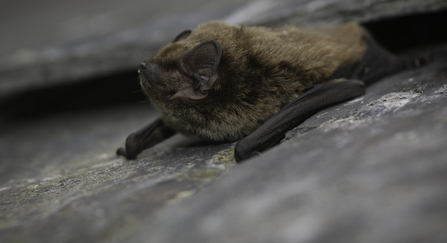
WildNet - Tom Marshall
Bats are nocturnal so it is unusual to see them during the day or in busy buildings.
Signs there may be a problem:
- Found on the ground
- Exposed during the day
- Trapped in the living area of a building
- Caught by a cat
- Baby bat on its own
- Obvious injury or trapped on flypaper/fishing hook
Who to contact:
The Bat Conservation Trust has a National Bat Helpline that can provide advice and contact details for local rehabilitators.
If immediate action required:
- Prepare a shoe box (or similar sized box) with ventilation holes and line with clean cloth or a tea towel.
- ALWAYS wear protective gloves and try not to handle the bat directly. If bitten or scratched, seek immediate medical advice.
- Try to capture the bat like you would a spider, placing the box over the top and then sliding the lid gently underneath.
- If that’s not possible, try to cover the bat with a clean cloth and scoop up to put in the box.
- You could include a plastic bottle cap, like a milk bottle cap, with a few drops of water
- Keep in a quiet safe location whilst seeking help.
Hedgehogs
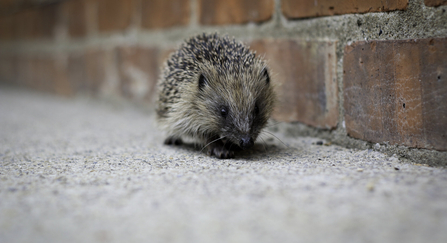
WildNet - Tom Marshall
Hedgehogs are mainly nocturnal and regular visitors to gardens in the evenings and early mornings. They hibernate November-mid March but can occasionally be seen out and about moving between nesting sites.
Signs there may be a problem:
- Obvious injuries like open wounds or trouble moving
- Seen out during the day, unsteady on their feet or lethargic with flies around them
- Very small hedgehogs (hoglets) seen out in the day without an adult or making a lot of noise.
Who to contact:
The British Hedgehog Preservation Society is a national organisation who can put you in touch with local hedgehog rehabilitators in your area - the main number for them is 01584 890 801.
If immediate action required:
- Prepare a high sided cardboard box with towels or scrunched up newspaper to allow the hedgehog to hide away.
- Using gardening gloves or some other form of protection, like a towel, pick up the hedgehog and put in the box.
- Keep the box indoors in a warm, quiet place with little disturbance. You can use a hot water bottle wrapped in a towel as a gentle heat source but fill it with warm water – not boiling – and make sure it doesn’t go cold as it can chill the hedgehog.
- You can place water and a small amount of wet cat or dog food in the box but don’t try to feed them directly.
Injured Wildlife
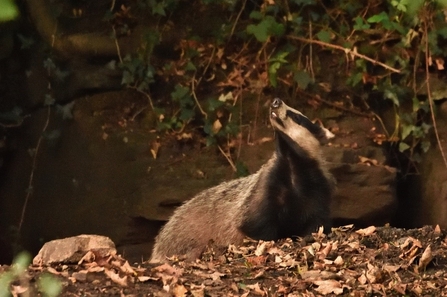
Jeff Chard
Signs there may be a problem:
- Obvious sign of injury like an open wound or broken limb.
- Unable to move
Who to contact:
For larger animals and birds, contact the RSPCA.
For smaller animals (smaller than a rabbit), try your local vets or wildlife rehabilitator.
Immediate action:
- Prepare a cardboard box with ventilation holes and line with newspaper or a towel.
- Always wear gloves and be extra careful with handling wildlife as they can bite and scratch if scared.
- Put the animal in the box and keep in a quiet safe location whilst seeking help.
